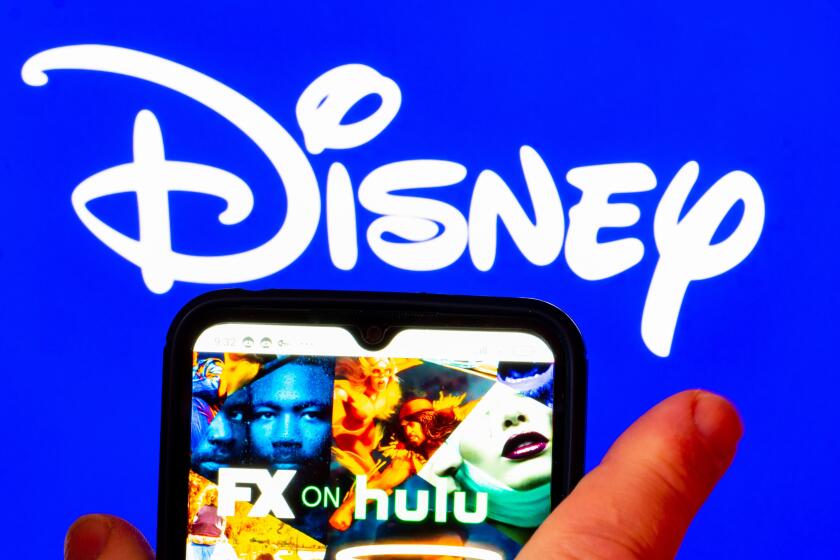Hot vax bummer: Delta variant dampens Hollywood’s box office recovery
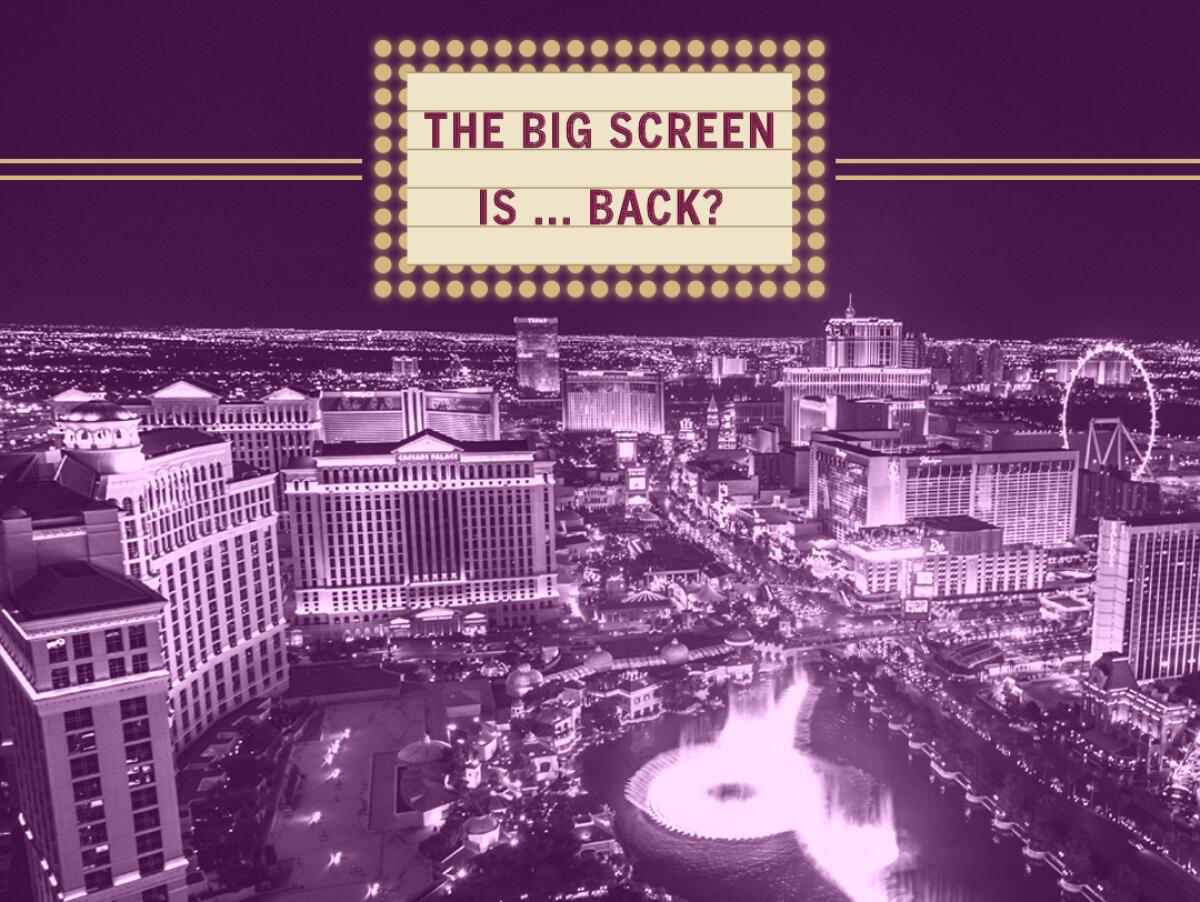
- Share via
This is the Aug. 24, 2021, edition of The Wide Shot, a weekly newsletter about everything happening in the business of entertainment. Sign up here to get it in your inbox.
For anyone who hasn’t been around the film business for the last few years, it might seem odd that theater owners are having a big party in Las Vegas with the slogan, “The Big Screen Is Back.” (First question: Is it?)
But of course that’s exactly what’s happening, because this week is CinemaCon, the usually annual confab of exhibitors and studios at Caesars Palace.
For those unfamiliar, this is an event where Sony film chairman Tom Rothman once uttered the phrase “Netflix, my ass” onstage and “The Dark Knight” director Christopher Nolan threw a Warner Bros. marketing executive under the bus for suggesting that the industry would have to adapt to changing consumer habits.
Inside the business of entertainment
The Wide Shot brings you news, analysis and insights on everything from streaming wars to production — and what it all means for the future.
You may occasionally receive promotional content from the Los Angeles Times.
This year’s convention is taking place at the strangest possible time, with the Delta variant raging and distributors starting to rethink their release plans once again.
Last week, Hollywood trades reported that Sony Pictures will sell “Hotel Transylvania 4” to Amazon Prime rather than take it to theaters. MGM and United Artists Releasing will debut the animated “Addams Family” sequel on premium video-on-demand at the same time it hits multiplexes. That deja vu feeling is back, despite MGM’s long-delayed Bond movie, “No Time to Die,” confirming a world premiere date for late September in London.
It’s easy to understand the uncertainty. Around the May release of “A Quiet Place Part II,” it seemed reasonable to predict a box office recovery slowly beginning in the summer and building momentum into the fall.
But Delta changed the picture. According to the latest National Research Group polling, just 66% of moviegoers are comfortable going to theaters right now, after comfort levels crested above 80% last month. Many movies have opened to respectable box office numbers, if we’re grading on a COVID curve, only to suffer dramatic drops in their second weekends.
Sure, Disney’s “Free Guy” declined only 35% in its second weekend, a sign that releasing it in theaters exclusively for 45 days worked for theaters and that people liked the movie. But the Ryan Reynolds comedy’s domestic box office is still just $58.5 million as of Sunday. With a production budget of about $115 million, that’s no reason to jubilantly throw popcorn in the air quite yet.
David A. Gross, who runs movie consultancy Franchise Entertainment Research, projects that the domestic box office from the weekends of Memorial Day to Labor Day will total $1.534 billion, down more than 50% from the same period in 2019. Year-to-date, box office is down 74% from two years ago, according to Comscore.
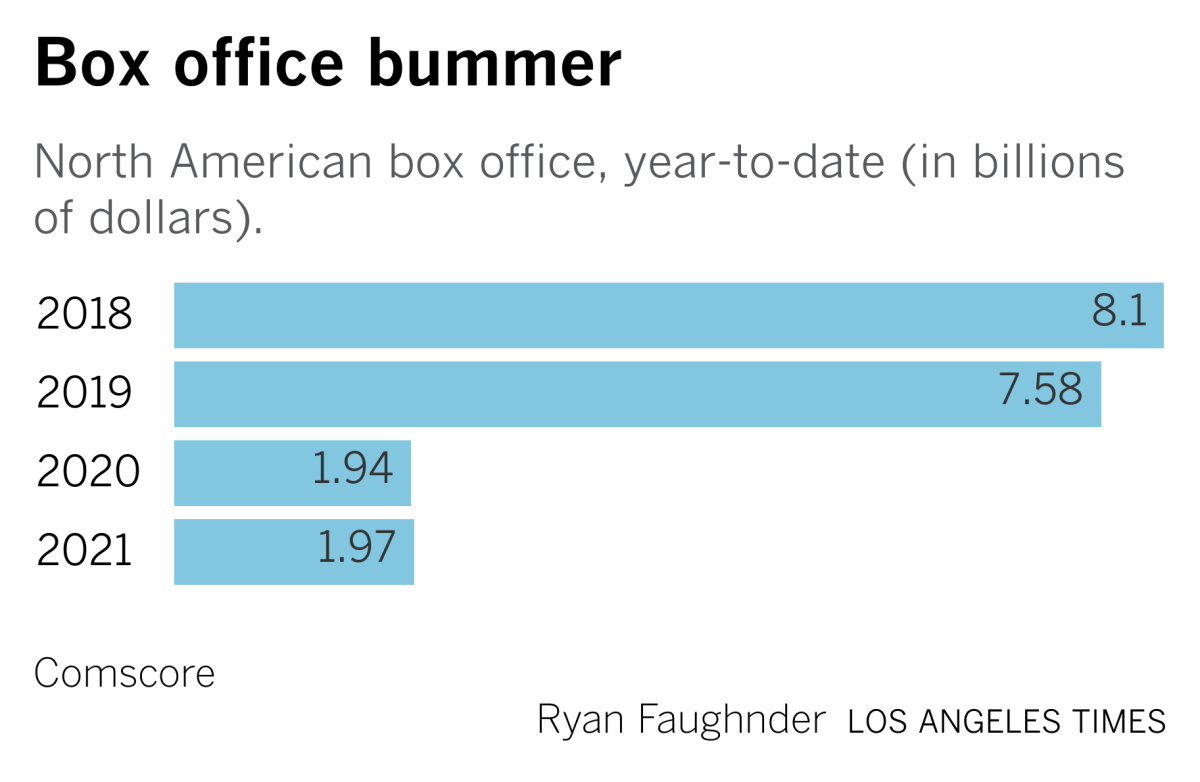
Box office won’t fully recover until the pandemic is over. Vaccine mandates for indoor venues, such as the one moving ahead in Los Angeles, might hurt sales in the short term while improving the overall business picture, though the locales that would benefit most from such requirements probably are the least likely to enact them.
And by “fully recover,” I mean, get back to whatever the new normal turns out to be. Studios believe that consumer behavior has changed. People are becoming used to watching new movies at home and most studios (at least the ones that have affiliated streaming services) are remaking their business models to reflect that reality. Half of Warner Bros.’ 2022 slate, or 10 films, will be sent straight to HBO Max. To what degree will theater owners acknowledge that reality?
While we’re at it, what will executives say about the once red-hot Chinese market, which has been a virtual dead zone for American movies since the release of “F9”?
The theater business isn’t going extinct but it does risk ending up considerably smaller and less important to the culture. (Kara Swisher, on her New York Times Opinion podcast “Sway,” had a lively conversation with Alamo Drafthouse founder Tim League that drilled into these issues.) To what degree that happens depends on what comes next.
This year’s CinemaCon festivities are expected to be muted, to say the least, compared to the past when studio heads and the world’s biggest movie stars would fly in to butter up theater owners.
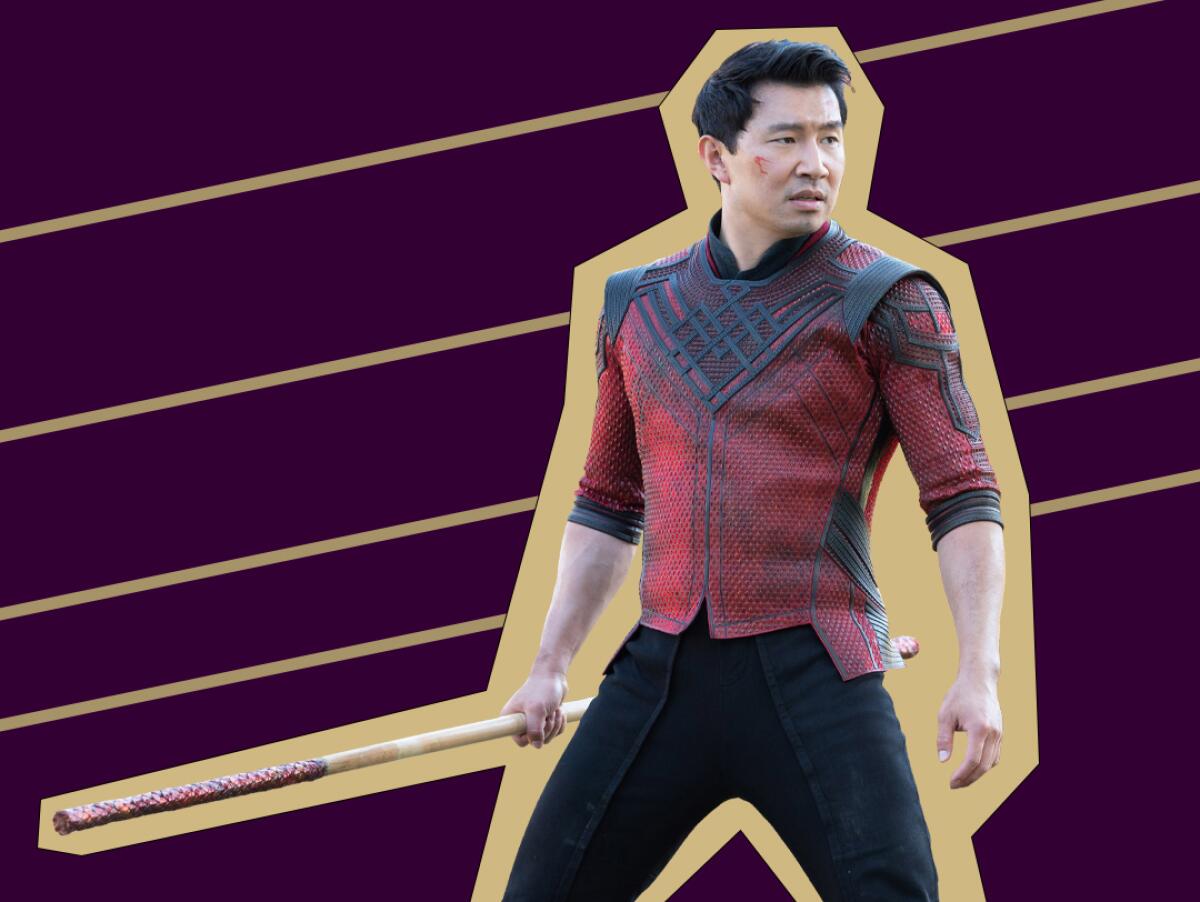
Many studios are sending just a handful of executives. Disney, once the belle of the ball among cinema operators, isn’t sending execs or talent at all. Instead of doing a traditional presentation of its movie slate, Disney will pull a substitute-teacher move and just play a full movie, Marvel’s “Shang-Chi and the Legend of the Ten Rings,” at 9:30 a.m. on Wednesday. Universal Pictures usually boasts the splashiest show of the bunch, often featuring a full-blown live musical number on the Colosseum stage. Not this time.
There can still be some surprises though. Sony Pictures on Monday night ended its presentation with an unexpected screening of “Ghostbusters: Afterlife.”
This comes after a May event at the AMC Century City, where studios played clips of upcoming films for three hours to a group of reporters and exhibitors. It was supposed to be the latest step in a campaign to bring audiences back to the cinema. But the messaging seemed more directed at the industry itself than at members of the public who might buy tickets.
Some insiders argue the big screen doesn’t need another pep rally. Theater owners already tried that, and it didn’t work. The business needs to figure out how to improve the theatrical experience so that the reality of going to the movies matches the idealized version the cinema industry sells. Some insiders I’ve spoken to also believe the industry needs to find a way to convey its message beyond the walls of Caesars Palace to the general public. So far, there hasn’t been much of a concerted marketing effort. Hey, maybe stream CinemaCon on Netflix! (I kid.)
I say this as I prepare to moderate a Thursday CinemaCon panel/luncheon that the Los Angeles Times is sponsoring. If you happen to be around then, come by and say hello! I’ll come back with thoughts after posing questions to the panelists, who include “Wonder Woman 1984” director Patty Jenkins.
“Wonder Woman 1984” was the first Warner Bros. title to go to HBO Max on the same day as theaters. I’ll be fascinated to hear how Jenkins feels about that now.
Stuff we wrote
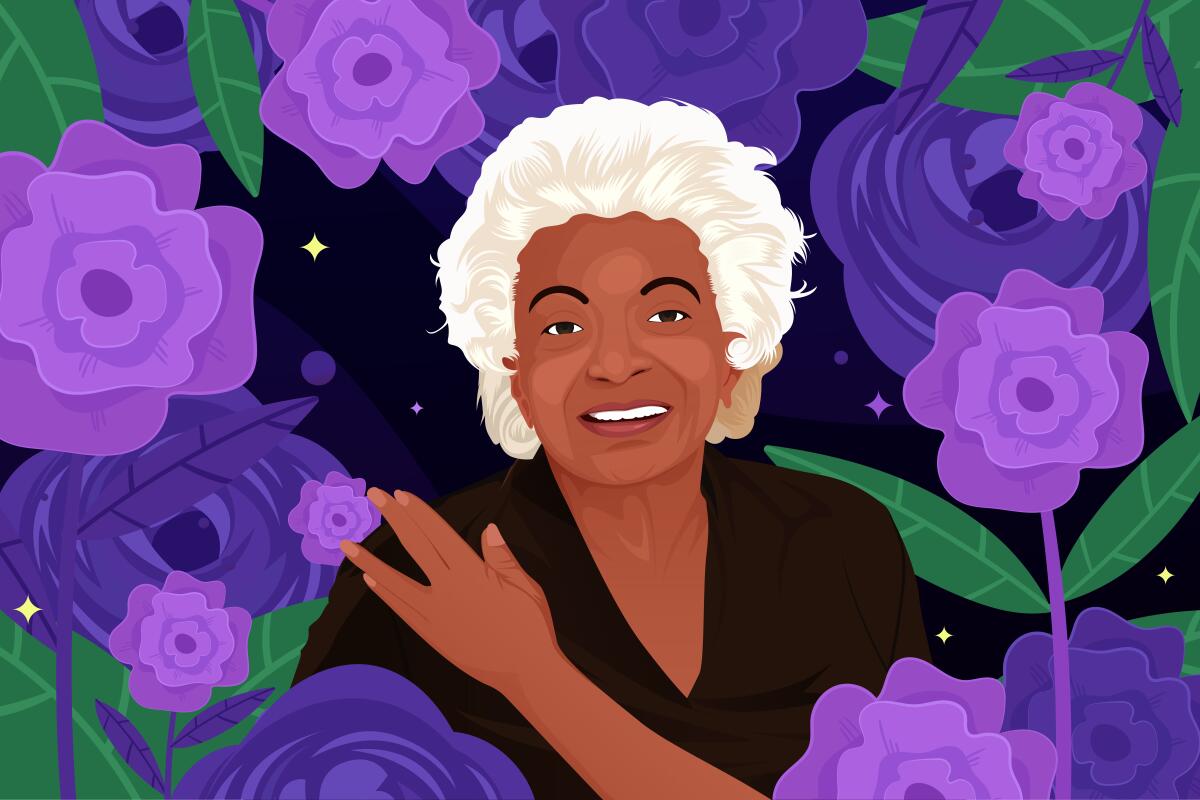
— Makeda Easter on the “heartbreaking” conservatorship battle of “Star Trek” legend Nichelle Nichols.
— Mark Olsen on why Sundance’s filmmaker labs should be a model for studio executives.
— Stephen Battaglio on the archivist who saved the historic footage that became “Summer of Soul.”
— Lorraine Ali on American TV’s handling of the crisis in Afghanistan: Networks ignored Afghanistan. Until parachuting in to watch it fall.
A host of problems
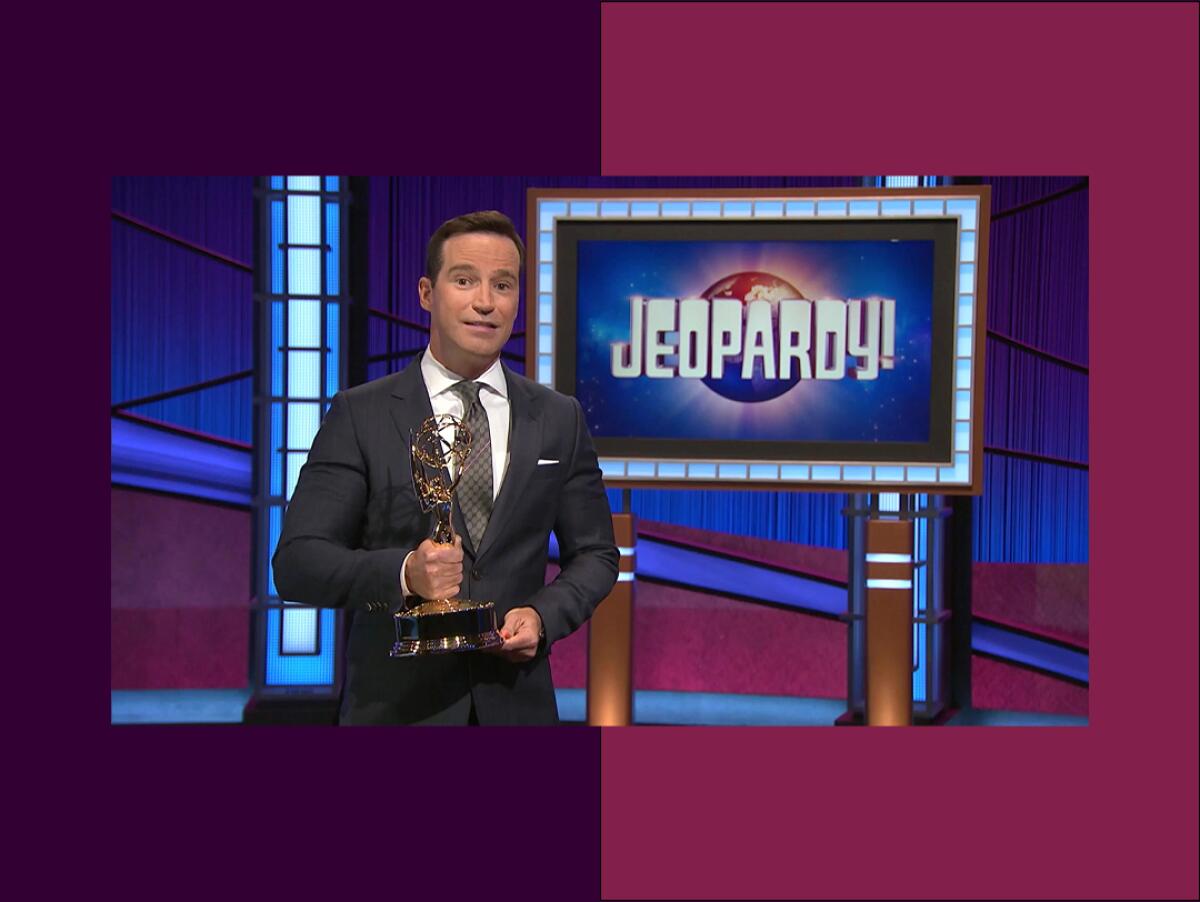
Stephen Battaglio and Meg James’ story on Sony Pictures’ “Jeopardy!” hosting debacle contained a line that got right to the point: “Overall, the process of replacing [the late Alex] Trebek has become a textbook example of how not to handle a popular long-running TV franchise.”
If you’re just catching up on this story, you should definitely read Claire McNear’s story for the Ringer that resulted in the show’s executive producer Mike Richards stepping down as host (he’ll remain in his production role). Ultimately the last straw wasn’t fans’ bafflement over the selection process that smacked of something other than a true bakeoff between candidates including Ken Jennings and LeVar Burton; it was comments that Richards made on his podcast called [checks notes] “The Randumb Show.”
All I’ll add is that, given today’s cultural climate, it’s remarkable that Richards’ comments about women’s bodies (among other things) didn’t come up in some kind of studio vetting process. Mayim Bialik, previously tapped to host prime-time “Jeopardy!” specials and spinoffs, will fill in as interim host.
Number of the week

One of the fun things about litigation is that it leads companies and individuals to disclose things they normally wouldn’t. Like Disney telling a court how much money “Black Widow” made online. In a filing in response to Scarlett Johansson’s blockbuster lawsuit, Disney said the Marvel film generated $125 million in digital download retail receipts at its “ticket” price of $30 for Disney+ subscribers. That’s on top of the $367 million the film grossed at the global box office. Both figures are tallies as of Aug. 15.
In its first weekend, “Black Widow” made $67 million worldwide through video-on-demand, including $55 million domestically. So in a little more than a month after its July 9 release, “Black Widow” doubled its digital sales.
This is the first official legal response by Disney in the case. The studio previously had only hit back in a statement to media outlets accusing Johansson of being callous amid the pandemic and saying her case had no merit. Disney’s legal strategy is to get the court to force Johansson into arbitration so the parties can resolve the matter behind closed doors. The actress’ representatives, who have accused the studio of cheating her out of box office bonuses with the film’s hybrid release in theaters and on Disney+, say they want the matter aired in open court.
As it pushes for arbitration, Disney also wants to argue that it tried to play fair with its star by including digital revenue when calculating Johansson’s compensation.
Nonetheless, Johansson’s attorneys will surely argue that the movie would have made more without the same day streaming release. But as entertainment attorney Jeffrey Finkelstein told my colleague Meg James, it will be difficult to determine just how much Disney’s decision to offer “Black Widow” on Disney+ cut into ticket sales, especially with moviegoers wary of going to theaters due to the Delta variant. Finkelstein did say it was reasonable to conclude that sales were “somewhat reduced by the day-and-date release” on Disney+. (Read more here.)
Deal time
— Rachel Maddow will remain at MSNBC as part of a broader deal with NBCUniversal, according to multiple reports. As CNN’s Brian Stelter writes, “This sounds like a news business version of the entertainment showrunner deals that have proliferated across Hollywood.”
— The Academy of Country Music Awards, produced by Dick Clark Productions, will stream on Amazon Prime Video, adding to the e-commerce giant’s budding live TV business. Amazon previously secured a deal with the NFL for “Thursday Night Football” games. As the first major awards show to go fully online after running on broadcast networks for decades, it marks a streaming milestone. But it also comes after TV ratings for such programs have suffered massive declines.
Hollywood production
Box office may be down, but Greater Los Angeles’ combined TV, film and commercial production days are actually up 11% from the same week in 2019, according to FilmL.A. data.
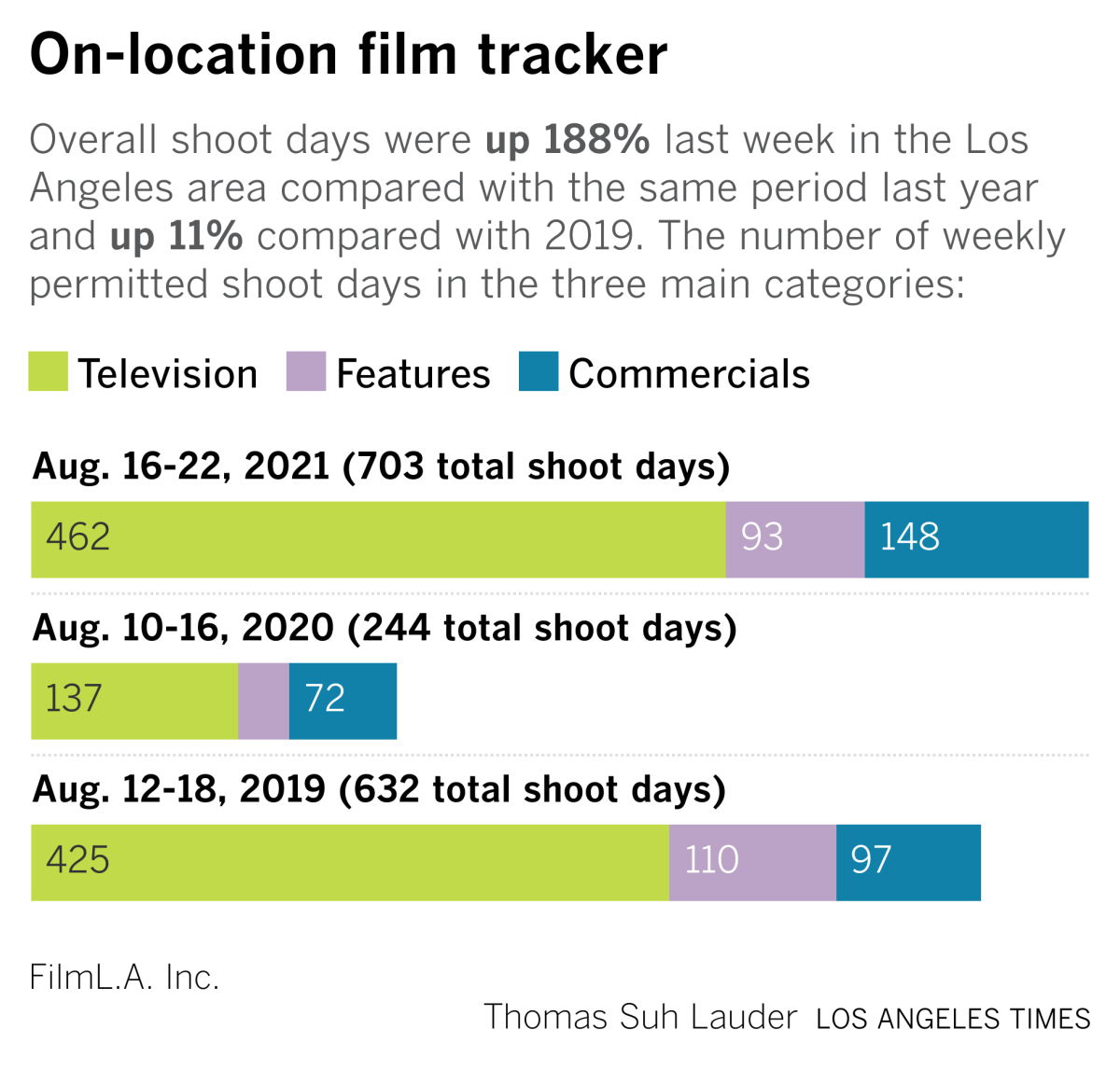
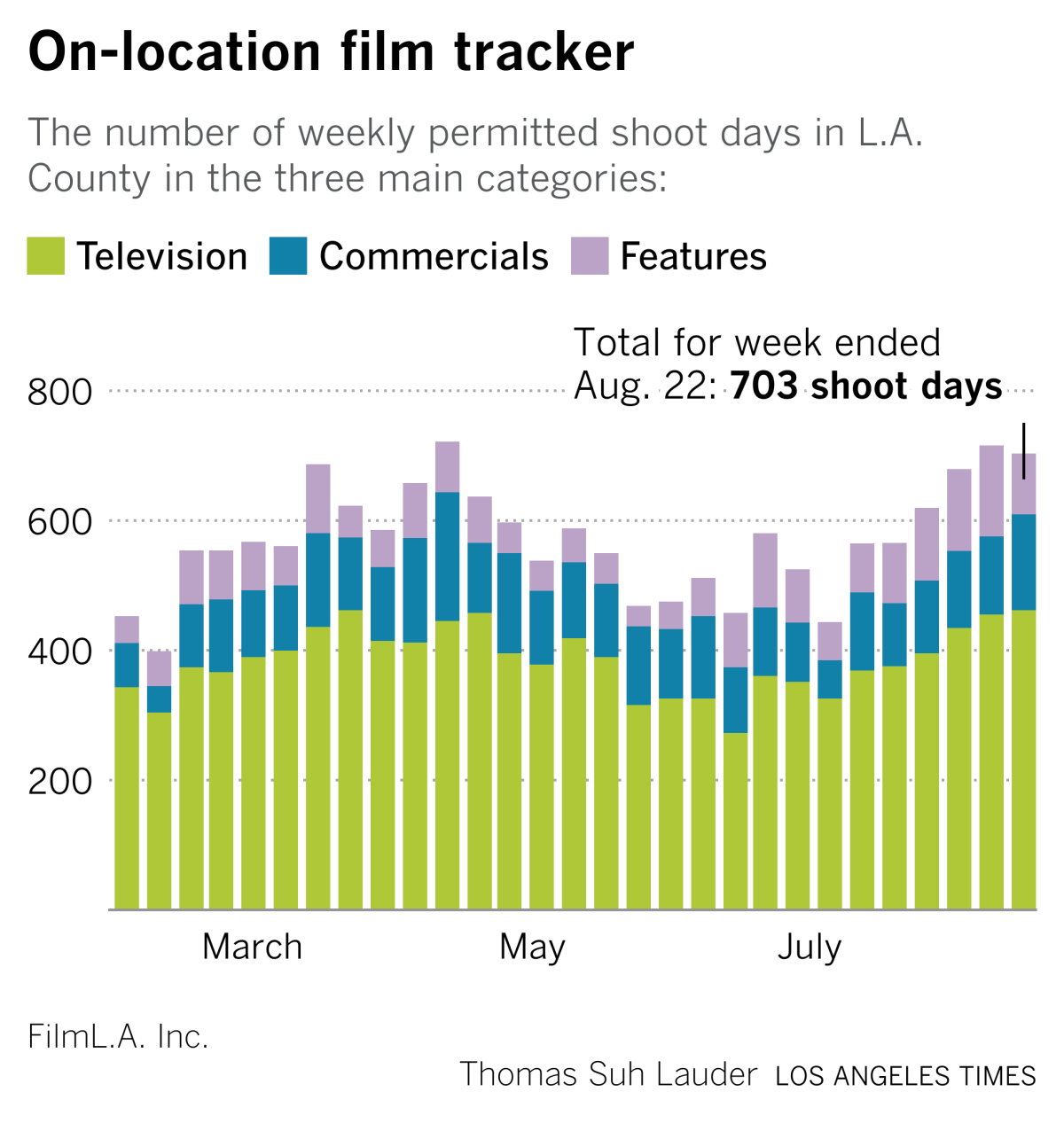
More stories from the week
— Turmoil was brewing at Time’s Up long before the allegations against Andrew Cuomo. The prominent anti-harassment nonprofit is facing an identity crisis over its ties to those in power. (New York Times)
— The untold stories of Wes Studi. When the actor broke through in “Dances With Wolves” and “The Last of the Mohicans,” he was cast as a terrifying villain. But for many in the Native community, he was a hero channeling decades of righteous anger. (GQ)
— When Raymond Chandler went to work for Billy Wilder. “Things weren’t easy between the creator of the hard-boiled detective and the high-flying director.” (New York Times)
— TV’s white guys are in crisis: Kathryn VanArendonk’s analysis addresses “The White Lotus” and “Ted Lasso,” and the way shows handle their straight white male characters. (Vulture)
— K-pop group BTS’ “Butter” is the song of the summer. So why doesn’t it feel like it? (Slate)
Parting shot...
Stephen Colbert’s riff on OnlyFans deciding to ban sexually explicit content got the headline. But I thought his bit about the Washington Football Team’s new name selection process was funnier.
Inside the business of entertainment
The Wide Shot brings you news, analysis and insights on everything from streaming wars to production — and what it all means for the future.
You may occasionally receive promotional content from the Los Angeles Times.




